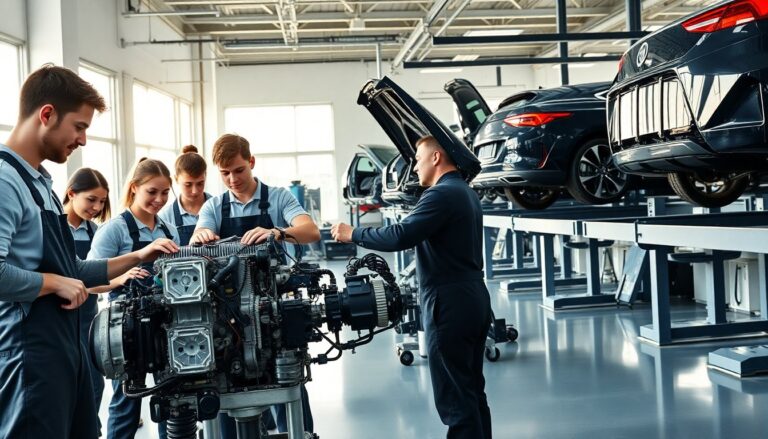Argomenti trattati
In today’s rapidly evolving automotive industry, obtaining a solid education in automotive technology is essential for those aiming to excel in this in-demand field. As vehicles become increasingly sophisticated, the need for skilled technicians to navigate modern automotive systems intensifies. This article will explore the core components of automotive technology programs, the skills you can expect to acquire, and the exciting career opportunities that await upon completion.
Understanding Automotive Technology Programs
Automotive technology programs are structured to equip students with the knowledge and practical skills necessary to diagnose, repair, and maintain contemporary vehicles. These programs typically provide hands-on training with state-of-the-art equipment, ensuring that students learn the latest techniques and technologies in the automotive sector.
Students engage with a comprehensive curriculum covering various facets of automotive technology—from engine repair and transmission systems to electrical systems and HVAC. This rigorous training prepares graduates to meet the demands of employers who seek well-rounded candidates proficient in both basic maintenance and complex repairs.
For many, the journey begins with essential vehicle maintenance tasks, such as oil changes, battery maintenance, and tire services. Mastering these foundational skills is critical, as they serve as the building blocks for more advanced training in areas like suspension systems, steering components, and braking systems.
Career Pathways and Opportunities
Graduating from an automotive technology program opens doors to various career opportunities. From quick service technicians to specialized repair experts, the automotive sector offers diverse roles catering to different interests and skill sets. Many graduates secure positions as maintenance technicians, light repair specialists, or service writers, all of which are vital in the automotive service industry.
As careers advance, individuals may choose to specialize in areas such as engine performance optimization or advanced diagnostics. Specialization can lead to higher-level positions, including service managers or advisors, where they bridge the gap between customers and technicians. Service managers oversee departmental operations, ensuring quality standards are met while maintaining efficiency and profitability.
With the automotive industry continually evolving, professionals armed with a solid educational background and hands-on experience are well-positioned to succeed. The integration of cutting-edge tools and technologies into training programs ensures graduates are prepared for today’s high-tech vehicles.
The Importance of Hands-On Training and Industry Partnerships
A key element of automotive technology education is the emphasis on hands-on training. Students typically spend considerable time working on live vehicle repair projects. This real-world experience is invaluable, allowing students to apply theoretical knowledge in practical settings, thereby enhancing their understanding and skill level.
Furthermore, partnerships with industry leaders enrich the educational experience. Collaborations with top automotive companies grant students access to the latest tools and technologies, ensuring they are well-versed in current industry standards. Such exposure not only enhances learning but also boosts employability upon graduation.
The expertise of instructors is another critical factor shaping the educational journey. Experienced educators holding ASE Master-Level certifications bring substantial knowledge to the classroom, guiding students through complex subjects and offering insights into the industry that cannot be gleaned from textbooks alone.
Conclusion: A Pathway to a Rewarding Career
Automotive technology programs are structured to equip students with the knowledge and practical skills necessary to diagnose, repair, and maintain contemporary vehicles. These programs typically provide hands-on training with state-of-the-art equipment, ensuring that students learn the latest techniques and technologies in the automotive sector.0

